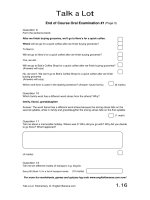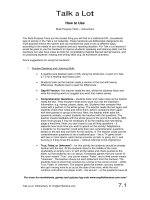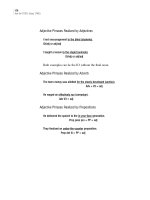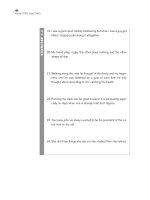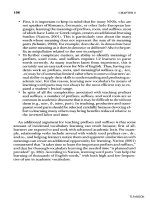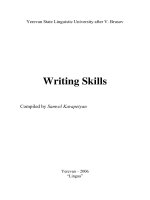Tài liệu Developing writting skills 1 part 9 pptx
Bạn đang xem bản rút gọn của tài liệu. Xem và tải ngay bản đầy đủ của tài liệu tại đây (199.9 KB, 10 trang )
•
one legitimate way (when accompanied by accurate
documentation) to borrow from a source.
• a more detailed restatement than a summary, which focuses
concisely on a single main idea.
Paraphrasing is a valuable skill because...
• it is better than quoting information from an undistinguished
passage.
• it helps you control the temptation to quote too much.
• the mental process required for successful paraphrasing
helps you to grasp the full meaning of the original.
6 Steps to Effective Paraphrasing
1. Reread the original passage until you understand its full
meaning.
2. Set the original aside, and write your paraphrase on a note
card.
3. Jot down a few words below your paraphrase to remind you
later how you envision using this material. At the top of the
note card, write a key word or phrase to indicate the subject
of your paraphrase.
4. Check your rendition with the original to make sure that your
version accurately expresses all the essential information in a
new form.
5. Use quotation marks to identify any unique term or
phraseology you have borrowed exactly from the source.
6. Record the source (including the page) on your note card so
that you can credit it easily if you decide to incorporate the
material into your paper.
Some examples to compare. The original passage:
Students frequently overuse direct quotation in taking notes,
and as a result they overuse quotations in the final [research] paper.
Probably only about 10% of your final manuscript should appear as
directly quoted matter. Therefore, you should strive to limit the
amount of exact transcribing of source materials while taking notes.
Lester, James D.
Writing Research Papers. 2nd ed. (1976): 46-47.
81
A legitamate paraphrase:
In research papers students often quote excessively, failing to
keep quoted material down to a desirable level. Since the problem
usually originates during note taking, it is essential to minimize the
material recorded verbatim (Lester 46-47)
An acceptable summary:
Students should take just a few notes in direct quotation from
sources to help minimize the amount of quoted material in a research
paper (Lester 46-47).
A plagiarized version:
Students often use too many direct quotations when they take
notes, resulting in too many of them in the final research paper. In
fact, probably only about 10% of the final copy should consist of
directly quoted material. So it is important to limit the amount of
source material copied while taking notes.
Exercise. On a separate piece of paper, write a paraphrase of each of the
following passages. Try not to look back at the original passage.
1. "The Antarctic is the vast source of cold on our planet, just
as the sun is the source of our heat, and it exerts tremendous control
on our climate," [Jacques] Cousteau told the camera. "The cold
ocean water around Antarctica flows north to mix with warmer water
from the tropics, and its upwellings help to cool both the surface
water and our atmosphere. Yet the fragility of this regulating system
is now threatened by human activity." From "Captain Cousteau,"
Audubon (May 1990):17.
2. The twenties were the years when drinking was against the
law, and the law was a bad joke because everyone knew of a local
bar where liquor could be had. They were the years when organized
crime ruled the cities, and the police seemed powerless to do
anything against it. Classical music was forgotten while jazz spread
throughout the land, and men like Bix Beiderbecke, Louis
Armstrong, and Count Basie became the heroes of the young. The
flapper was born in the twenties, and with her bobbed hair and short
skirts, she symbolized, perhaps more than anyone or anything else,
America's break with the past. From Kathleen Yancey,
English 102
Supplemental Guide (1989): 25.
82
3. Of the more than 1000 bicycling deaths each year, three-
fourths are caused by head injuries. Half of those killed are school-
age children. One study concluded that wearing a bike helmet can
reduce the risk of head injury by 85 percent. In an accident, a bike
helmet absorbs the shock and cushions the head. From "Bike
Helmets: Unused Lifesavers,"
Consumer Reports (May 1990): 348.
4. Matisse is the best painter ever at putting the viewer at the
scene. He's the most realistic of all modern artists, if you admit the
feel of the breeze as necessary to a landscape and the smell of
oranges as essential to a still life. "The Casbah Gate" depicts the
well-known gateway Bab el Aassa, which pierces the southern wall
of the city near the sultan's palace. With scrubby coats of ivory, aqua,
blue, and rose delicately fenced by the liveliest gray outline in art
history, Matisse gets the essence of a Tangier afternoon, including
the subtle presence of the bowaab, the sentry who sits and surveys
those who pass through the gate. From Peter Plagens, "Bright
Lights."
Newsweek (26 March 1990): 50.
5. While the Sears Tower is arguably the greatest achievement
in skyscraper engineering so far, it's unlikely that architects and
engineers have abandoned the quest for the world's tallest building.
The question is: Just how high can a building go? Structural engineer
William LeMessurier has designed a skyscraper nearly one-half mile
high, twice as tall as the Sears Tower. And architect Robert Sobel
claims that existing technology could produce a 500-story building.
From Ron Bachman, "Reaching for the Sky."
Dial (May 1990): 15.
Section 3. Writing Practice. Composition Writing.
Exercise 1.
Sounds of Silence
Writers are told to "use all senses." Here's a different twist
on using the senses. For this exercise, we're going to describe
silence. The challenge is in describing something that is not there. In
this exercise, you are not allowed to use words like "silence" or
"quiet." Show the reader the silence through other details. To get
started on this exercise, you might want to sit in silence. Listen. Take
note of what you hear. You can also start this exercise by freewriting
83
for ten or fifteen minutes about silence in order to get warmed up.
Then write a scene in which you describe silence. Use the setting to
fit the tone and mood. It can be anything you want. Try to do at least
a page. As always, have fun with it!
Exercise 2. Using your imagination or drawing on your friends’ experience,
complete the following story. Find a suitable title for your story.
I woke up with a start and sat up, wondering for a moment
where I was. There was nothing but the sea around me, and only in
the distance could I make out the faint line of the coast. My skin was
burning, but I felt chilly because of the fresh breeze which was
blowing from the land. The breeze must have carried me out to sea
while I lay asleep on my lilo (air mattress), I thought, feeling cold
with fear. ...
84
Lesson 9
Section 1. Spelling: Homophones
Note: Homophones are words, which are pronounced in the
same way, but spelled in a different way.
Exercise. Copy the following homophones and look up their meanings in
the dictionary. Insert in the blank spaces the appropriate word from
following group of homophones:
a) (air – heir / bare – bear / beach – beech / beat – beet / birth –
berth / bean – been / berry – bury / brake – break)
1. He got up with an … of relief and yet reluctance. 2. For a
moment I could not feel my heart. It had stopped … . 3. The
classroom should be … during the break. 4. I saw the mother sitting
at the table, her head … in her hand. 5. The garden looked … and
deserted. 6. I suddenly pushed open the garden gate and stepped
inside to pick some … from the nearest bush. 7. John was the only …
to his uncle’s estate. 8. He knows how many … make five. Don’t try
to fool him with that suggestion. 9. The upper … was occupied by a
young man who never took part in our conversation. 10. Wait a bit.
We’ll discuss it in the … . 11. While we were cutting up potatoes,
carrots and …roots for the soup I looked up and suddenly burst out
laughing. 12. The news that Mrs. Davis had given … to a daughter
seemed to make no impression on her relatives. 13. Jerry was the
first to … the silence. 14. The … has a massive body, coarse heavy
fur and relatively short limbs. 15. I can’t … the way you treat that
man. 16. We hired a boat and rowed along the coast until we found a
beautiful secluded … . 17. A wood of mostly poplars and … and
fringed with reeds stretched along one bank. 18. I’ve always …
treated as a gentleman. 19. The driver put on the … and the car
stopped.
b) (
bow – bough / course – coarse / cell – sell / cent – sent – scent /
current – currant / dear – deer / dew – due / die – dye)
85
